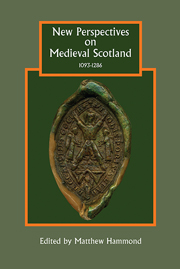Book contents
- Frontmatter
- Contents
- List of illustrations and tables
- List of contributors
- Acknowledgements
- Abbreviations
- Maps
- 1 Introduction: The paradox of medieval Scotland, 1093–1286
- 2 The Scottish ‘political community’ in the reign of Alexander II (1214–49)
- 3 Homo ligius and unfreedom in medieval Scotland
- 4 Scottish royal government in the thirteenth century from an English perspective
- 5 Neighbours, the neighbourhood, and the visnet in Scotland, 1125–1300
- 6 Cistercian identities in twelfth- and thirteenth-century Scotland: the case of Melrose Abbey
- 7 The language of objects: material culture in medieval Scotland
- 8 Structuring that which cannot be structured: a role for formal models in representing aspects of medieval Scotland
- Bibliography
- Index
- STUDIES IN CELTIC HISTORY
4 - Scottish royal government in the thirteenth century from an English perspective
Published online by Cambridge University Press: 05 August 2013
- Frontmatter
- Contents
- List of illustrations and tables
- List of contributors
- Acknowledgements
- Abbreviations
- Maps
- 1 Introduction: The paradox of medieval Scotland, 1093–1286
- 2 The Scottish ‘political community’ in the reign of Alexander II (1214–49)
- 3 Homo ligius and unfreedom in medieval Scotland
- 4 Scottish royal government in the thirteenth century from an English perspective
- 5 Neighbours, the neighbourhood, and the visnet in Scotland, 1125–1300
- 6 Cistercian identities in twelfth- and thirteenth-century Scotland: the case of Melrose Abbey
- 7 The language of objects: material culture in medieval Scotland
- 8 Structuring that which cannot be structured: a role for formal models in representing aspects of medieval Scotland
- Bibliography
- Index
- STUDIES IN CELTIC HISTORY
Summary
All historians would agree that English identity in the thirteenth century was shaped by both the burdens and the benefits of royal government. It was in reaction to the burdens that the rebels of 1215, in Magna Carta's security clause, called into being ‘the community of the land’ to enforce the Charter's terms. Yet the realm, or much of it, was also united by the ‘common law’, ‘a royal benefit granted to the people by the goodness of the king’, as Glanvill put it, which meant that throughout England, a vast amount of civil litigation was decided by juries before royal justices, according to standard forms initiated by the king's writs. In Scotland, too, kingship and national identity were intimately related. Indeed, if, as seems the case, the diverse peoples within the boundaries of modern Scotland came to think of themselves as Scottish during the course of the thirteenth century, that was largely because of their common allegiance to the king of Scots. The process, however, worked very differently north of the border. In Scotland, historians are agreed, the burdens of royal government were far lighter than they were in England. As a result, it was far easier for national identity to grow ‘with’ rather than ‘against’ the king. The first part of this essay will deploy new evidence to show just how extreme this contrast between England and Scotland was.
- Type
- Chapter
- Information
- New Perspectives on Medieval Scotland, 1093-1286 , pp. 117 - 160Publisher: Boydell & BrewerPrint publication year: 2013



